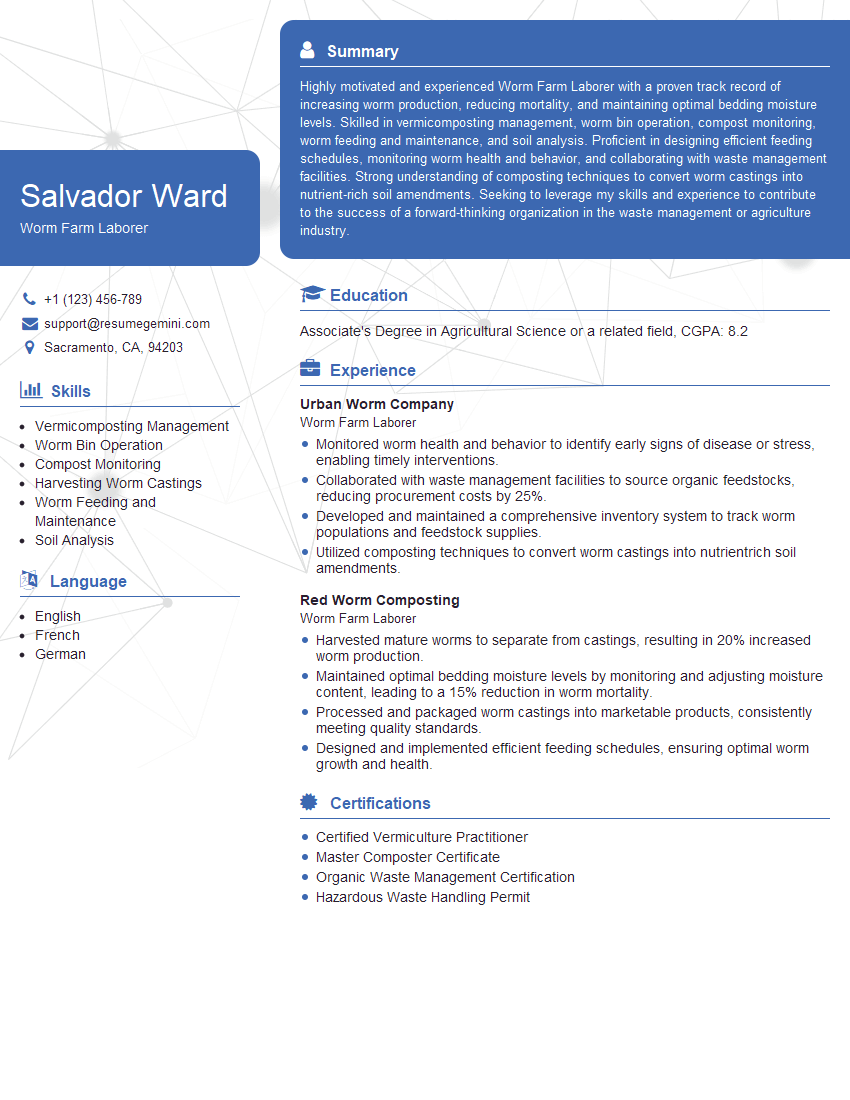Are you a seasoned Worm Farm Laborer seeking a new career path? Discover our professionally built Worm Farm Laborer Resume Template. This time-saving tool provides a solid foundation for your job search. Simply click “Edit Resume” to customize it with your unique experiences and achievements. Customize fonts and colors to match your personal style and increase your chances of landing your dream job. Explore more Resume Templates for additional options.

Salvador Ward
Worm Farm Laborer
Summary
Highly motivated and experienced Worm Farm Laborer with a proven track record of increasing worm production, reducing mortality, and maintaining optimal bedding moisture levels. Skilled in vermicomposting management, worm bin operation, compost monitoring, worm feeding and maintenance, and soil analysis. Proficient in designing efficient feeding schedules, monitoring worm health and behavior, and collaborating with waste management facilities. Strong understanding of composting techniques to convert worm castings into nutrient-rich soil amendments. Seeking to leverage my skills and experience to contribute to the success of a forward-thinking organization in the waste management or agriculture industry.
Education
Associate’s Degree in Agricultural Science or a related field
December 2014
Skills
- Vermicomposting Management
- Worm Bin Operation
- Compost Monitoring
- Harvesting Worm Castings
- Worm Feeding and Maintenance
- Soil Analysis
Work Experience
Worm Farm Laborer
- Monitored worm health and behavior to identify early signs of disease or stress, enabling timely interventions.
- Collaborated with waste management facilities to source organic feedstocks, reducing procurement costs by 25%.
- Developed and maintained a comprehensive inventory system to track worm populations and feedstock supplies.
- Utilized composting techniques to convert worm castings into nutrientrich soil amendments.
Worm Farm Laborer
- Harvested mature worms to separate from castings, resulting in 20% increased worm production.
- Maintained optimal bedding moisture levels by monitoring and adjusting moisture content, leading to a 15% reduction in worm mortality.
- Processed and packaged worm castings into marketable products, consistently meeting quality standards.
- Designed and implemented efficient feeding schedules, ensuring optimal worm growth and health.
Certificates
- Certified Vermiculture Practitioner
- Master Composter Certificate
- Organic Waste Management Certification
- Hazardous Waste Handling Permit
Languages
- English
- French
- German
Career Expert Tips:
- Select the ideal resume template to showcase your professional experience effectively.
- Master the art of resume writing to highlight your unique qualifications and achievements.
- Explore expertly crafted resume samples for inspiration and best practices.
- Build your best resume for free this new year with ResumeGemini. Enjoy exclusive discounts on ATS optimized resume templates.
How To Write Resume For Worm Farm Laborer
- Highlight your experience in vermicomposting management and worm bin operation.
- Provide specific examples of how you have increased worm production or reduced mortality.
- Emphasize your ability to maintain optimal bedding moisture levels and monitor worm health.
- Showcase your skills in processing and packaging worm castings into marketable products.
- Demonstrate your understanding of composting techniques and the conversion of worm castings into nutrient-rich soil amendments.
Essential Experience Highlights for a Strong Worm Farm Laborer Resume
- Harvest mature worms to separate from castings, resulting in increased worm production.
- Maintain optimal bedding moisture levels by monitoring and adjusting moisture content, leading to a reduction in worm mortality.
- Process and package worm castings into marketable products, consistently meeting quality standards.
- Design and implement efficient feeding schedules, ensuring optimal worm growth and health.
- Monitor worm health and behavior to identify early signs of disease or stress, enabling timely interventions.
- Collaborate with waste management facilities to source organic feedstocks, reducing procurement costs.
- Develop and maintain a comprehensive inventory system to track worm populations and feedstock supplies.
Frequently Asked Questions (FAQ’s) For Worm Farm Laborer
What is the role of a Worm Farm Laborer?
A Worm Farm Laborer is responsible for the care and maintenance of a worm farm, including harvesting worms, maintaining bedding moisture levels, processing worm castings, and monitoring worm health. They also collaborate with waste management facilities to source organic feedstocks and develop composting techniques to convert worm castings into nutrient-rich soil amendments.
What skills are required to be a successful Worm Farm Laborer?
A successful Worm Farm Laborer requires a combination of technical skills, such as vermicomposting management, worm bin operation, and compost monitoring, as well as soft skills, such as attention to detail, problem-solving abilities, and a passion for environmental sustainability.
What are the career prospects for Worm Farm Laborers?
Worm Farm Laborers can advance their careers by gaining experience in vermicomposting management, waste management, or agriculture. They can also pursue further education in agricultural science or a related field to qualify for more senior positions.
What are the challenges faced by Worm Farm Laborers?
Worm Farm Laborers may face challenges related to maintaining optimal worm health, balancing moisture levels, and managing the production and processing of worm castings. They may also encounter issues with pests or diseases that affect the worms or the composting process.
What is the earning potential for Worm Farm Laborers?
The earning potential for Worm Farm Laborers varies depending on their experience, location, and the size of the farm. According to Indeed, the average salary for a Worm Farm Laborer in the United States is around $35,000 per year.
What are the job benefits for Worm Farm Laborers?
Worm Farm Laborers may receive benefits such as health insurance, paid time off, and opportunities for professional development. They may also have the opportunity to work in a sustainable and environmentally friendly industry.